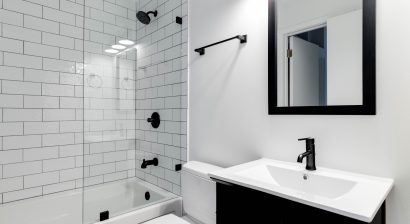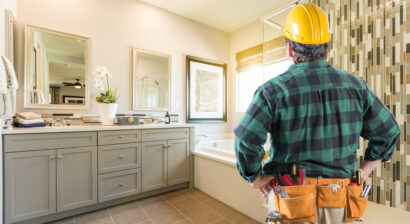Do I Need a Permit to Remodel a Bathroom?
Do I Need a Permit to Remodel a Bathroom?
Home remodeling is a great way to improve the comfort, functionality, and value of your property. Whether you want to update the style, increase the space, or enhance the efficiency of your bathroom, you need to plan ahead and consider the potential implications of your project.
One of the most important aspects of any home renovation is obtaining the necessary permits from your local authorities.
Permits are official documents that authorize you to perform certain types of work on your property, such as plumbing, electrical, structural, or mechanical changes.
Why Obtain a Permit?
There are three main reasons why you should obtain a permit for your bathroom remodeling project: legal considerations and safety concerns.
1. Legal Considerations
Every locality has its own regulations for home renovations. Not having the required permits could lead to fines, penalties, or issues when you try to sell your home.
2. Safety Concerns
Permits ensure that your remodeling work meets local safety standards. This is especially significant for plumbing or electrical work which, if done improperly, can pose safety risks.
Types of Bathroom Remodels and Their Permit Requirements
Not all bathroom remodels are created equal. Some involve a simple splash of paint, while others transform the entire space. As the scope changes, so do the requirements. Generally speaking, there are three types of bathroom remodels: cosmetic changes, major alterations, and expansions.
1. Cosmetic Changes
Cosmetic changes are minor modifications that do not affect the structure, plumbing, electrical, or mechanical systems of your bathroom. They include things such as:
- Painting
- Replacing fixtures such as faucets, showerheads, toilets, sinks, etc.
- Installing new cabinets, countertops, tiles, flooring, etc.
- Adding accessories such as mirrors, shelves, towel bars, etc.
Cosmetic changes usually do not require a permit as they do not involve any significant changes to your bathroom. However, you should still check with your local authorities before starting any work as some areas may have specific rules or restrictions regarding cosmetic changes.
2. Major Alterations
Major alterations are significant modifications that affect the structure, plumbing, electrical, or mechanical systems of your bathroom. They include things such as:
- Changing the layout or configuration of your bathroom
- Moving or adding walls, doors, windows, etc.
- Moving or adding plumbing or electrical components such as pipes, wires, outlets, switches, etc.
- Moving or adding mechanical components such as fans, vents, heaters, etc.
Major alterations usually require a permit as they involve substantial changes to your bathroom that may affect its safety and functionality. You should always consult with your local authorities before starting any work as they will determine the type and scope of permit needed for your project.
3. Expansions
Expansions are additions that increase the size or number of bathrooms in your home. They include things such as:
- Adding square footage to your existing bathroom
- Integrating a new bathroom into an existing space such as a closet or attic
- Building a new bathroom from scratch on your property
Expansions always require a permit as they involve creating new structures or spaces that may affect the zoning, design, and utility systems of your home. You should always consult with your local authorities before starting any work as they will determine the type and scope of permit needed for your project.
The Process of Obtaining a Bathroom Remodeling Permit
The exact steps involved in the permit process may vary depending on where you live and what type of work you are planning to do, but generally it involves the following: research, application, and inspection.
1. Research
Begin with your local municipal or county website to understand the regulations. Many local governments have resources dedicated to home renovations.
2. Application
You’ll likely need to submit detailed plans of your intended remodel. Be prepared to pay a fee, and understand there might be a waiting period.
3. Inspection
Once your remodel is done, an inspector may visit to ensure everything adheres to code. This could occur at various stages of the remodel, depending on your locality.
FAQs
Here are some frequently asked questions about obtaining a permit for bathroom remodeling:
1. Can I perform a bathroom remodel myself or do I need a contractor?
This depends on the type and complexity of your bathroom remodeling project and your level of skill and experience. Generally speaking, cosmetic changes can be done by yourself if you have the necessary tools and materials and follow the instructions and safety precautions. However, major alterations and expansions may require a contractor who has the expertise, license, insurance, and permit to perform the work.
2. What happens if I do work without a permit?
If you did work without a permit, you may face legal consequences such as fines, penalties, or even lawsuits. You may also have to undo the work or bring it up to code at your own expense. Additionally, you may have trouble selling your home or obtaining insurance if the work is not permitted. Therefore, it is always advisable to obtain a permit for your bathroom remodeling project and keep a record of it for future reference.
3. How long does the permit process usually take?
The permit process may vary depending on where you live and what type of work you are planning to do, but generally it takes a few days or weeks before you receive a permit approval. You may also have to wait for an inspection appointment or schedule one yourself. You should always plan ahead and apply for a permit as early as possible to avoid any delays or complications in your project.
4. Are there any exceptions to permit requirements?
There may be some exceptions to permit requirements depending on where you live and what type of work you are planning to do. You should always check with your local authorities before starting any work to find out if there are any exemptions or waivers for your project.
Final Thoughts
Obtaining a permit for your bathroom remodeling project is an important step that ensures that your work is legal, safe, and valuable. By understanding the local regulations and requirements, you can avoid any potential issues with your bathroom remodel.






